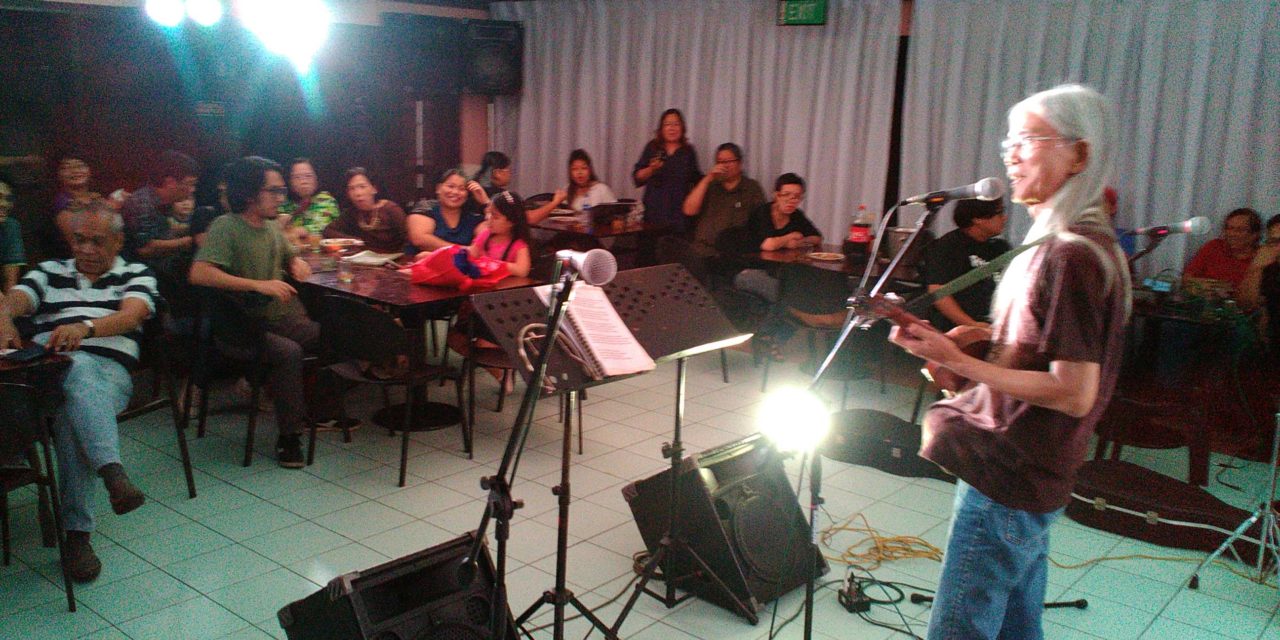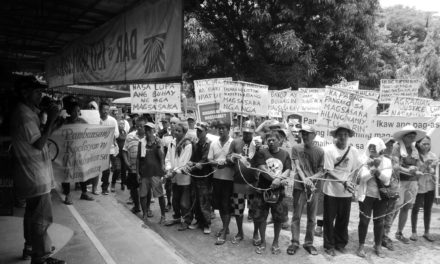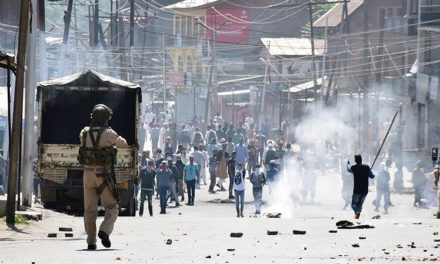The event Songs of Disquiet, Hymns of Rage, held December 28 in Quezon City, Philippines, might have been a reunion of sorts of ‘70s and ‘80s activists, including musicians of the said era, but the ‘mini-concert’ cum conversation-with-the-artists was more than just a coming together of activist-musicians who had been a familiar, popular sight not in concert halls nor auditoriums but on the streets and makeshift stages during rallies and other protest actions against the Marcos dictatorship. The artists’ performances and sharing underscored the continuing relevance of protest music in the context of contemporary Philippine society and politics.
In the tradition of folk music, poet-songwriter and musician Jess Santiago has handily added new lyrics to his song Onli in the Pilipins (Only in the Philippines, a popular phrase to describe practices and phenomena uniquely or strangely Filipino) to reflect current developments in Philippine society and politics, such as the rise of the so-called social media activism or “clicktivism.” This is a critique of those whose ‘political involvement’ begins and ends in social media posts and the number of times they ‘like’ and ‘share’ posts on Facebook. “But when asked to join rallies, they have a million excuses,” so goes the song in Filipino.
The Village Idiots, one of whose members is Focus’ Joseph Purugganan, performed Ang Panginoon (lord/god), which was about George W. Bush and his war mongering; Santiago wrote the song in 2002, eight months before the US’ invasion of Iraq. But the song uncannily reminded the audience of a president who according to one of the group’s vocalists is also “utak pulbura” (literally one who has gunpowder for a brain) and whose favorite words since he assumed office in July has been “kill, kill, kill.” The Village Idiots also performed Unang Araw ng Abril (First Day of April), penned by Purugganan. The song recounted the bloody dispersal by the police of hungry farmers and indigenous peoples who had marched to Kidapawan to demand for rice. Three farmers died and dozens were hurt in the incident.
Activist-musician Bong Ramilo who’s now based in Darwin, Australia spoke of his music as his response to social-political issues that affect him. His trademark creative process is that the music comes to him first before the lyrics do. His protest music is both personal and political. Ramilo’s ‘classic’ activist song in the ‘80s, which remains popular until today, was May Panahon (There is a Time) or also known Awit ng Petiburges or Song of the petit bourgeois, which talks about the situation often faced by middle class activists torn between the pull of their comfortable life and political activism. Ramilo is one of the founders of the Asian People’s Protest Music.
Referring to him and the other musicians present as “oldies,” Ramilo said that they still carried the “desire to perform their existing material – which is relevant and timely again – as well as to make new materials to respond to current realities.”
Ramilo also expressed appreciation of “the audience who were of the same generation as most of the performers (that is, the pre-millennial generation), and who were visibly moved and engaged upon hearing (and singing along to) the songs of their generation, with some of them declaring their renewed inspiration on social media after the event.”
Rom Dongeto, founding member of the former Buklod (literally linked or joined) performed with current band Layag (boat’s sail; or to travel). Their rendering of the ‘classic’ protest song Tatsulok (Triangle) drew out sighs of nostalgia from the audience; the song spoke of inequality and how it would persist as long as elitist political and economic power relations are not subverted.
Another highlight of the night was when Babae Ka (You’re a Woman) was performed by composer-singer Ramon Ayco; said song was originally by the ‘70s-‘80s feminist band Inang Laya (mother freedom).
Also, award-winning writer and former political prisoner Levy Balgos Dela Cruz delivered his own poem, Pag-aalabin Natin ang Salita (We Shall Set Aflame the Words) and Lilikumin Natin ang Apoy (We Shall Gather the Fire).
The presence of the millennials, Teatrong Bayan (People’s Theater) and Julian, a student from the University of Sto. Tomas, provided the intergenerational dimension to the event. Teatrong Bayan performed material from pre-millennial times, such as Musikang Bayan’s Pahayagan (Newspaper) as well as their own work. These songs are about the current climate of fear, extrajudicial killings, and violence.
Julian performed his own rap piece, to the delight of millennial and oldies alike. A duo from Pampanga (a province in central Luzon and political bailiwick of former President, now Congresswoman, Gloria Macapagal Arroyo) was very contemporary in their stand-up, theatrical performance, but with current social-political issues as themes. Other youth groups that performed: Kulturang Bayan (People’s Culture) of the Polytechnic University of the Philippines, Teatro Fernandino of Pampanga, and Manu (another solo artist).
The younger artists proved how the tradition of protest music has been kept alive. The songs may be more in the tune of pop or reggae, or done as rap but most of the social-political messages have not changed.
The title of the event itself was a take-off from the collection of reportage, Days of Disquiet, Nights of Rage, on the First Quarter Storm by then award-winning journalist and poet Pete Lacaba. Known as FQS, the event comprised a series of protest actions in January 1971 led by students and youth against the Marcos regime. It had been compared to a storm because of the intensity of the resistance against the growing poverty, corruption, and repression under Marcos.
Focus co-organized with the Asian People’s Protest Music (APPM) and Philippine Rural Reconstruction Movement (PRRM) the December 29 event, which gathered more than 60 activists, artists, academics, members of media, among others. The organizers plan to do follow-up activities, such as workshops and continuing conversations with the youth and artists, with the goal of yielding new songs and creative productions (poems, films, and other arts) that respond to the call of the times.









